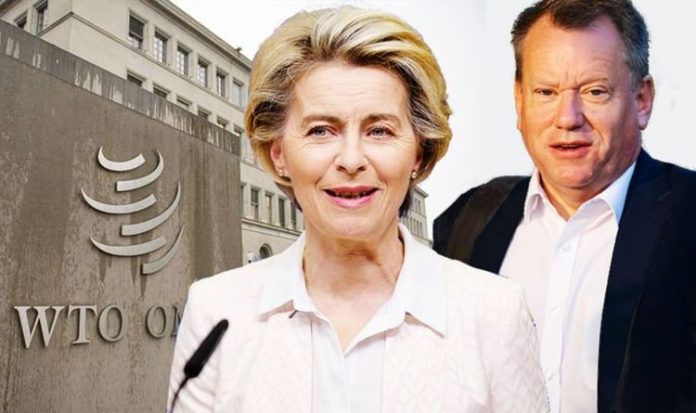For months the key sticking points in the Brexit trade talks have been the same: fishing rights and common standards. As the negotiations reach their final state, though, it appears the latter, also known as the “level playing field”, might be the biggest stumbling block. Since the beginning of the talks, the EU has insisted that in order to have access to its single market, Britain needs to sign up to regulatory alignment, creating a “level playing field” on which EU member states and other countries can trade.
Downing Street has stood firm, insisting Brexit is about regaining sovereignty and to be able to set the UK’s own rules, outside of EU regulations.
The UK’s chief Brexit negotiator Lord David Frost famously said regulatory divergence is “the point of the whole Brexit project” and anything less “simply fails to see the point of what we are doing”.
Before becoming Britain’s top Brexit negotiator, though, Lord Frost admitted the UK “will have to inherit the EU’s trading rules at the WTO”, before later diverging.
After Britain voted to leave in June 2016, Lord Frost, a long time ambassador, wrote a column for The Telegraph, in which he praised the role of then-International Trade Secretary Liam Fox.
He argued that even though, at the time, Mr Fox could not negotiate in the World Trade Organisation (WTO) and sign trade deals, the former minister had a very important job: to mark a presence in the world.
He also urged Mr Fox to make clear that, “although we will have to inherit the EU’s trading rules at the WTO in the short run, we intend rapidly to reduce as many as possible of these tariffs and quotas to zero”.
Lord Frost added: “That would be a powerful statement of confidence in Britain’s openness to the world and the ability to sustain ourselves as a global trader.
“Some argue that this will stop us getting good trade deals.
“Why should other countries get rid of their tariffs if we have already scrapped ours? I don’t buy this argument.
“Tariffs tend to be the easy bit of free-trade agreements.
“What makes the difference is agreement on regulations and product standards, services, and investment.
“By moving on tariffs we can focus on the things that really matter.”
In a different column published a few days after the Brexit referendum, Mr Johnson’s special adviser also did not rule out rejoining the EU after a transition period.
He wrote: “First, we need to be realistic about how to negotiate Brexit.
“It will be our most complex negotiation ever. We can’t afford to get it wrong. Whole industries could be destroyed if we do so.”
Adopting a Norway status immediately as a transitional arrangement, Mr Frost wrote, would have been the best option.
Leaving the door open to rejoining the bloc, he also claimed that after the scheduled exit, Britain should have retained this status for five years and use the period to either reflect or, if necessary, negotiate an FTA like Canada’s.
He explained: “Remainers and Leavers should also be able to unite around this as a transitional arrangement.
“Remainers because it is the least disruptive in the short run and would preserve important economic and business interests like the financial services passport.
“Leavers because it would achieve Brexit quickly, extract us from everything bar the single market and some closely associated policies, return to us our own farming and fisheries policies, and gives us at least the protection of the EEA safeguard clause for free movement.
“And if we want to go further, we always have that option.”
In an exclusive interview with Express.co.uk, former Ukip MP Douglas Carswell said he had no doubts about Lord Frost’s capabilities and negotiating skills.
Mr Carswell said: “I met David Frost as a new MP when I happened to go to Denmark on a House of Commons Select Committee trip.
“He was the ambassador in Copenhagen.
“I met this extraordinary man – who was the first and one of the only British officials who was clearly eurosceptic.
“He understood intellectually why Britain should be outside Europe.”
Referring to a lecture the special adviser made at Brussels’ ULB university in February, the prominent Brexiteer added: “His speech was spot on.
“A brilliant understanding of history.
“The reason why I became a eurosceptic is because I read a book about history and it showed that the reason why Europe was the number one centre of civilisation and innovation was because it didn’t have centralised control.
“Like China or India.
“David Frost clearly understands the intellectual origins and rationale of euroscepticism.
“I was very impressed with his lecture and I was very impressed when I met him ten years ago.
“I think he’s doing a fantastic job and that he will do a fantastic job.”







